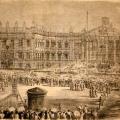Kolkata

The city of Kolkata, formerly known as Calcutta is one of the biggest cities of India, located on the present state of West Bengal, to which the city is the capital. During the times of the East India Company and the British Raj, until 1911, it was the capital of the British India and the main commerce hub for Indian exports. At some point it even was the second largest city of the empire, only surpassed by London itself. The city was also an important cultural hub, because of the European influence during the Imperial Period, in which Indian-British literature flourish.
Sources:
Marshall, P. (2001). The Cambridge Illustrated History of the British Empire. Cambridge University Press.
Sinha, N. & Banerjee-Guha, S. (2025). Kolkata. Encylopaedia Britannica, website: Kolkata | History, Population, Government, & Facts | Britannica
Image of Public Domain.
Coordinates
Longitude: 88.355407901108

